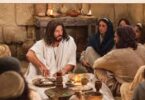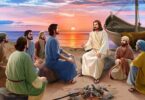29th Sunday of Ordinary Time (Year B)
Readings: Isaiah 53:10-11; Hebrews 4:14-16; Mark 10:35-45
Pier Giorgio Michelangelo Frassati was born in Turin, Italy on April 6, 1901. Pier Giorgio Frassati lived a life of deep self-denial, dedicating himself to serving the poor despite his wealthy background. He gave away his money, belongings, and even his time, often sacrificing personal comforts like vacations to care for the sick and needy. His spiritual life, centred on daily communion, Eucharistic adoration, and prayer, fuelled his acts of charity. Even in his final days, suffering from poliomyelitis, his last concern was delivering medicine to a poor man. Pier Giorgio’s life was a constant offering of himself for others, embodying true Christian selflessness. He died at the age of 24 on July 4, 1925. His mortal remains found completely intact and incorrupt upon their exhumation on March 31, 1981, were transferred to the cathedral in Turin. St. Pope John Paul II called him “A man of eight beatitudes”. Pope Francis mentioned him in his apostolic exhortation, “Christus vivit”. It is said that he is going to be canonized during the Jubilee year. His life reveals the most magnificent truth of Christian life: self-denial is an indispensable character to be with the Lord.
The liturgy of the day helps us understand this most important truth. Every reading in the liturgy of the word today, attests to this truth. The first reading is from the Book of Isaiah and is taken from the endings of the third suffering servant hymn. It tells us that the Lord revealed his plans. That he is pleased with the suffering of the servant. His sacrifice will save everyone. His death will bring good to everyone. His suffering will be a ransom for the faults of many. The hymn emphasises the themes of obedience, suffering, and trust in God. The servant is an innocent figure who accepts self-denial as part of his divine mission. The church looks at Christ as the fulfilment of the prophecy of Isaiah.
In the second reading, the author of the letter to Hebrew makes a bold claim that Christ is the chief priest who mediates between the people and God. It is interesting to note that the author of Hebrews is the only writer in the New Testament who makes this claim. We can imagine the role of the high priest. He was the only one who could enter the Holy of Holies, once a year, to mediate for the whole people of Israel on the Day of Atonement. He offered sacrifice on behalf of the people. When the high priest entered the Holy of Holies it meant that he entered heaven. Jesus is qualified to represent us because he was tested in every sense but He did not sin. He is the perfect mediator because he becomes the role model of self-denial.
Both the readings prepare us well for the reflection on the Gospel today. James and John knew that Jesus was talking about the Kingdom of God. They were also part of the inner circle. They were responding to the third passion- the death prediction of Jesus. We know that the disciples failed miserably each time to understand what Jesus was trying to say while he was predicting his passion and death. The disciples were seeking an honoured place at the side of Jesus as the ten disciples. But they were not able to understand the messianic secret that Jesus had to be denied by the elders of the community and suffer heinous death on the cross. They failed to grasp that the ultimate throne of Jesus was the cross on earth. Jesus was referring himself to as the suffering servant (the first reading). Jesus’ entire life—from His Incarnation to His death on the cross—was a continuous example of self-denial. He gave up divine privilege, comfort, and even His life, always choosing obedience to the Father’s will and love for humanity over His desires. This self-denial is at the heart of His redemptive mission, offering a powerful example for Christians to follow. It is well depicted by St. Paul in his letter to the Philippians. (Philip 2:6-7)
James, John, all the disciples of the Lord, and Blessed Pier Giorgio Michelangelo Frassati followed the example of the Lord. They denied themselves to follow the ways of the Lord. They are revered as saints today. They understood the truth of life. They denied themselves. Jesus called His followers to imitate His self-denial, saying, “Whoever wants to be my disciple must deny themselves and take up their cross daily and follow me” (Luke 9:23). This call emphasizes that self-denial is a fundamental part of Christian discipleship. Are you ready to deny yourself to follow Christ?
Fr. Alex D’Mello
Diocese of Sindhudurg







